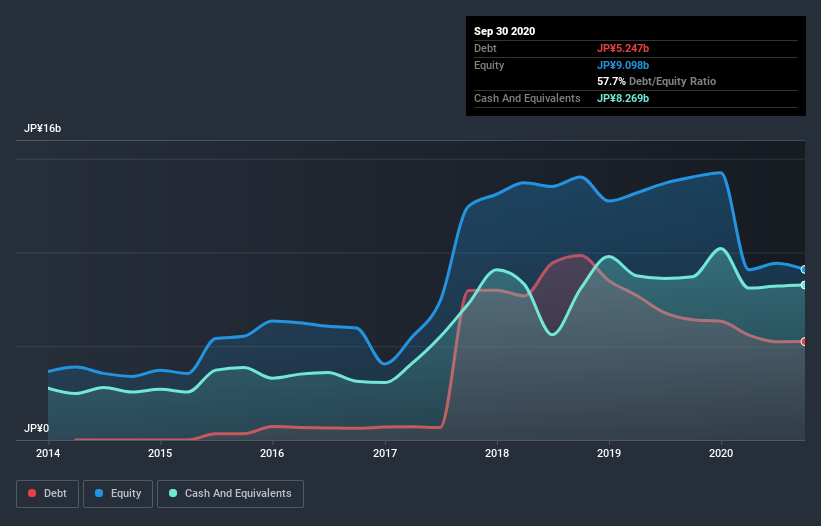- Japan
- /
- Entertainment
- /
- TSE:3758
These 4 Measures Indicate That Aeria (TYO:3758) Is Using Debt Reasonably Well

Legendary fund manager Li Lu (who Charlie Munger backed) once said, 'The biggest investment risk is not the volatility of prices, but whether you will suffer a permanent loss of capital.' So it seems the smart money knows that debt - which is usually involved in bankruptcies - is a very important factor, when you assess how risky a company is. As with many other companies Aeria Inc. (TYO:3758) makes use of debt. But is this debt a concern to shareholders?
What Risk Does Debt Bring?
Debt and other liabilities become risky for a business when it cannot easily fulfill those obligations, either with free cash flow or by raising capital at an attractive price. If things get really bad, the lenders can take control of the business. However, a more common (but still painful) scenario is that it has to raise new equity capital at a low price, thus permanently diluting shareholders. Of course, debt can be an important tool in businesses, particularly capital heavy businesses. The first thing to do when considering how much debt a business uses is to look at its cash and debt together.
See our latest analysis for Aeria
What Is Aeria's Debt?
You can click the graphic below for the historical numbers, but it shows that Aeria had JP¥5.25b of debt in September 2020, down from JP¥6.42b, one year before. But it also has JP¥8.27b in cash to offset that, meaning it has JP¥3.02b net cash.

A Look At Aeria's Liabilities
According to the last reported balance sheet, Aeria had liabilities of JP¥7.19b due within 12 months, and liabilities of JP¥3.58b due beyond 12 months. Offsetting these obligations, it had cash of JP¥8.27b as well as receivables valued at JP¥3.15b due within 12 months. So it actually has JP¥644.0m more liquid assets than total liabilities.
This surplus suggests that Aeria has a conservative balance sheet, and could probably eliminate its debt without much difficulty. Succinctly put, Aeria boasts net cash, so it's fair to say it does not have a heavy debt load!
It is just as well that Aeria's load is not too heavy, because its EBIT was down 73% over the last year. Falling earnings (if the trend continues) could eventually make even modest debt quite risky. There's no doubt that we learn most about debt from the balance sheet. But it is Aeria's earnings that will influence how the balance sheet holds up in the future. So if you're keen to discover more about its earnings, it might be worth checking out this graph of its long term earnings trend.
But our final consideration is also important, because a company cannot pay debt with paper profits; it needs cold hard cash. Aeria may have net cash on the balance sheet, but it is still interesting to look at how well the business converts its earnings before interest and tax (EBIT) to free cash flow, because that will influence both its need for, and its capacity to manage debt. Over the last three years, Aeria actually produced more free cash flow than EBIT. That sort of strong cash generation warms our hearts like a puppy in a bumblebee suit.
Summing up
While it is always sensible to investigate a company's debt, in this case Aeria has JP¥3.02b in net cash and a decent-looking balance sheet. And it impressed us with free cash flow of JP¥1.8b, being 152% of its EBIT. So we are not troubled with Aeria's debt use. When analysing debt levels, the balance sheet is the obvious place to start. But ultimately, every company can contain risks that exist outside of the balance sheet. To that end, you should learn about the 2 warning signs we've spotted with Aeria (including 1 which is shouldn't be ignored) .
Of course, if you're the type of investor who prefers buying stocks without the burden of debt, then don't hesitate to discover our exclusive list of net cash growth stocks, today.
If you’re looking to trade Aeria, open an account with the lowest-cost* platform trusted by professionals, Interactive Brokers. Their clients from over 200 countries and territories trade stocks, options, futures, forex, bonds and funds worldwide from a single integrated account. Promoted
New: Manage All Your Stock Portfolios in One Place
We've created the ultimate portfolio companion for stock investors, and it's free.
• Connect an unlimited number of Portfolios and see your total in one currency
• Be alerted to new Warning Signs or Risks via email or mobile
• Track the Fair Value of your stocks
This article by Simply Wall St is general in nature. It does not constitute a recommendation to buy or sell any stock, and does not take account of your objectives, or your financial situation. We aim to bring you long-term focused analysis driven by fundamental data. Note that our analysis may not factor in the latest price-sensitive company announcements or qualitative material. Simply Wall St has no position in any stocks mentioned.
*Interactive Brokers Rated Lowest Cost Broker by StockBrokers.com Annual Online Review 2020
Have feedback on this article? Concerned about the content? Get in touch with us directly. Alternatively, email editorial-team@simplywallst.com.
About TSE:3758
Mediocre balance sheet and slightly overvalued.
Market Insights
Community Narratives


